Thanks to clinic work, U.N. human rights advisors conclude Chemours and DuPont knew about risks but kept making toxic PFAS chemicals
A U.N. human rights panel calls on the U.N. Environment Assembly to take on “forever chemicals” at a meeting in Nairobi, citing a North Carolina PFAS plant as an example of environmental negligence, Inside Climate News, 2/26/24U.N. experts say DuPont and Chemours generated extensive contamination with toxic “forever chemicals” in North Carolina
American chemical companies DuPont and Chemours have discharged toxic per- and polyfluoroalkyl substances (PFAS) into the local environment, disregarding the rights and wellbeing of residents along the lower Cape Fear River in North Carolina, say U.N. experts. United Nations Human Rights Office of the High Commissioner, 2/21/24Following clinic complaint, U.N. Human Rights Council experts call out Chemours and DuPont for U.S. PFAS contamination
The United Nations Human Rights Council issued a press statement calling out American chemical companies, Chemours and DuPont, for “disregarding the rights and wellbeing” of residents in North Carolina, who have been unknowingly exposed to extreme levels of toxic per- and polyfluoroalkyl substances (PFAS) for decades. Environmental Law Clinic, 2/21/24Environmental Law Clinic Fall 2023 Newsletter
Environmental Law Clinic, 12/22/23Clinic client settles with Bay Area air district to increase transparency and community participation
Communities for a Better Environment, 9/5/23ELC client Communities for a Better Environment reaches settlement agreement with Bay Area Air Quality Management District
Environmental Law Clinic, 9/2/23Clinic files complaint with United Nations about PFAS contamination of drinking water
Environmental Law Clinic, 4/27/23Clinic files lawsuit against Oakland foundry and Bay Area regulatory agency to protect neighbors from toxic air pollution
Communities for a Better Environment, 10/25/2022Director Claudia Polsky comments on clinic’s work to address toxic PFAS chemicals in drinking water
E&E News/Politico, 1/27/2022Clinic comments call for EPA to designate BIPOC as particularly vulnerable to toxic chemical harms
In comments submitted on Dec. 8, 2021, four public health and environmental justice organizations called on the U.S. Environmental Protection Agency (EPA) to formally designate people of color as a vulnerable population that must be protected from unreasonable health risks caused by exposure to the plastics-related chemicals known as phthalates. 12/8/21Bill spurred by ELC energy justice report clears key committee
California Senate Bill 476, legislation to implement the main recommendations of a recent ELC report on environmental justice aspects of clean energy financing, cleared the Senate Banking Committee on an 8-to-1 vote. 4/21/21ELC marks 11th memorial of the BP Deepwater Horizon oil spill by challenging U.S. oil spill response plan
On behalf of an Inupiaq health worker in Alaska, a commercial fisher in Louisiana, and multiple environmental groups, ELC has filed its opening merits brief challenging EPA’s nationwide plan for responding to oil spills. 4/20/21Utility trade press cites clinic’s energy justice litigation against PG&E
The trade publication Utility Dive describes ELC’s recent Public Utilities Commission filing that protests PG&E’s proposal to use polluting diesel power during public safety power shutoffs. 3/31/21Major gift advances clinic’s environmental health and justice work
Orrick and Chairman Mitch Zuklie ’96 together pledged $250,000 to the clinic over five years — which also unlocked an anonymous $1 million gift made on a 4-to-1 matching basis. 3/21ELC advocacy helps push state energy-related agencies to fully decarbonize the grid
The clinic’s emphasis on equity issues in shaping the state’s energy future — and in particular, the need to avoid further pollution in environmental justice communities — in 2020 took the form of an extensive ELC comment letter on implementation of Senate Bill 100, key legislation pushing California toward a renewable energy future. 12/20Jack Chang ’20: Who’s on the Hook for Refinery Accidents?
We believe that people deserve to know whether fossil fuel companies can pay for their mistakes. As it turns out, after two months of digging, we finally were able to obtain Phillips 66’s insurance documents at the California Office of Spill Prevention and Response, a branch of the state’s Fish and Wildlife Department that protects waterways. 11/6/20ELC joins fight against Formosa petrochemicals plant; Army Corps suspends permit
In October 2020, ELC filed a proposed amicus brief in federal district court on behalf of the Louisiana environmental justice groups Concerned Citizens of Saint Johns and Justice and Beyond, opposing the construction permit for a huge plastics production and petrochemical complex in the highly polluted area known as “Cancer Alley” or “Death Alley.” 10/20Clinic-assisted cosmetics safety bill enacted as nation’s strongest disclosure law
The “Cosmetic Fragrance and Flavor Ingredient Right to Know Act” was signed into law after two years of work by ELC students, who partnered with client Breast Cancer Prevention Partners to force public disclosure of known-toxic ingredients in cosmetics and personal care products. Director Claudia Polsky discussed the bill in this San Francisco Chronicle op-ed. 10/1/20Clinic Celebrates Progress Towards an Equitable Microgrid Policy
Teaching Fellow Heather Lewis on a California Public Utilities Commission decision about developing microgrids in communities of color and low-income communities, Legal Planet, 6/26/20Alyssa Cheung M.P.P. ’21: Microgrids Will Save Lives and Green the Golden State
If the state wants to truly protect its most vulnerable, and also meet its ambitious climate goals, the state and its and electric utilities must ensure that microgrids benefit disadvantaged communities as quickly as possible.Sarae Snyder ’21: PG&E’s Power Shut-Offs Exacerbate Existing Inequities
As utilities such as Pacific Gas & Electric continue to power society with failing infrastructure due to decades of mismanagement, Public Safety Power Shutoffswill continue to be the reality during California’s fire seasons for the foreseeable future.Clinical Supervising Attorney Roger Lin Discusses Environmental Justice on KPFA’s “Rude Awakening”
"Rude Awakening," KPFA (7/12 interview starts at 21:20)Clinic Advocates for the Health of Low-Income Communities and Communities of Color
Environmental Law Clinic, 6/12/20Judge: EPA Must Update 26-Year-Old Plan for Offshore Oil Spills
Environmental Law Clinic and Center for Biological DiversityKristina Sinclair ’19: Evolution of the Pesticide Project
For two semesters, I witnessed the scope of our representation expand dramatically as we learned more about our client’s long-term goals and saw first-hand how our strategies changed over time. Through visuals and explanations, I demonstrate how this project evolved over time.Natalie Collins ’20: How a client’s toxics exposure case unfolded
While Hardeman v. Monsanto was taking place in San Francisco, my clinic team was watching rural North Carolina. In spring 2018, North Carolina artist Yvonne Hegney had called ELC with a question: how could she identify the inert ingredients in a given pesticide?Candice Youngblood ’19: Lessons in zealous advocacy
Part of the value of clinic participation is learning how to advocate for a real-life client, as opposed to the hypothetical clients we deal with in our legal writing courses.Adam Buchholz M.P.P. ’20: A new attitude towards numbers
“Numbers are not worth the sweat we pour into them.” As a policy student in a program focused on quantitative methods, that sentence ... was hard to read. It seemed that my primary interest might not be worth the time. Fortunately, first readings can be misleading.Camila Gonzalez ’20: Confessions of an administrative law nerd
Not only are dispersants an ineffective oil spill response strategy, but they also harm human health and marine ecosystems.Sandra Lupien M.P.P. ’18: Empathy as advocacy
For those 78,400 Californians who spend nights on streets, in parks, in vehicles, the struggle to access toilets and clean water for drinking and bathing is central to daily life.Heather Jones ’19: How I learned to stop worrying and love economics
I learned many things in [the clinic], but loving the study of economics was not one of them. Instead ... I learned to embrace both my role as a translator of complex material to an administrative agency and the general public and to embrace ambiguity and uncertainty in complex public policy issues.Daniel Lopez ’19: The barriers to decision-making
If you told me after my sophomore year in college, that I would voluntarily sign up for a project in law school that required economic research, I would have thought you were crazy.Cristina de la Paz LL.M. ’19: Clinic’s role in your legal education
Being away on your LL.M. may make you feel like you are getting rusty with the rudimentary “lawyer” work. Clinic is your way back, behind the computer, typing ferociously for your client.
-
Bill spurred by ELC energy justice report clears key committee (April 21, 2021)
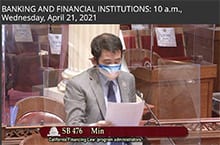 California Senate Bill 476, legislation to implement the main recommendations of a recent ELC report on environmental justice aspects of clean energy financing, today cleared the Senate Banking Committee on an 8-to-1 vote. The bill would reform a key program for financing residential energy efficiency and solar power, to prevent contractor fraud on low-income homeowners seeking to go green. Pictured: Senator Dave Min (D-Irvine) introduces the bill to the committee.
California Senate Bill 476, legislation to implement the main recommendations of a recent ELC report on environmental justice aspects of clean energy financing, today cleared the Senate Banking Committee on an 8-to-1 vote. The bill would reform a key program for financing residential energy efficiency and solar power, to prevent contractor fraud on low-income homeowners seeking to go green. Pictured: Senator Dave Min (D-Irvine) introduces the bill to the committee. -
ELC marks 11th memorial of the BP Deepwater Horizon oil spill by challenging U.S. oil spill response plan (April 20, 2021)
 On behalf of an Inupiaq health worker in Alaska, a commercial fisher in Louisiana, and multiple environmental groups, ELC has filed its opening merits brief challenging EPA’s nationwide plan for responding to oil spills. This National Contingency Plan relies heavily on use of toxic chemicals to disperse (but not, to effectively clean up) spilled oil. The case will be heard on July 7, 2021 in U.S. district court in San Francisco. The Center for Biological Diversity serves as co-counsel in this matter.
On behalf of an Inupiaq health worker in Alaska, a commercial fisher in Louisiana, and multiple environmental groups, ELC has filed its opening merits brief challenging EPA’s nationwide plan for responding to oil spills. This National Contingency Plan relies heavily on use of toxic chemicals to disperse (but not, to effectively clean up) spilled oil. The case will be heard on July 7, 2021 in U.S. district court in San Francisco. The Center for Biological Diversity serves as co-counsel in this matter. - Utility trade press cites clinic’s energy justice litigation against PG&E (March 31, 2021)
The trade publication Utility Dive describes ELC’s recent Public Utilities Commission filing that protests PG&E’s proposal to use polluting diesel power during public safety power shutoffs. Clinic Supervising Attorney Heather Lewis and students recently filed these comments on behalf of the California Environmental Justice Alliance. -
ELC report prompts state bill to reform green energy financing (March 2021)
 ELC’s recent report, The Dark Side of the Sun: How PACE Financing Has Under-Delivered Green Benefits and Harmed Low-Income Homeowners (Feb. 2021), is already spurring legislation. Senate Bill 476, authored by Dave Min (D-Irvine), would implement ELC recommendations for enhancing consumer protections in a key program through which Californian homeowners finance residential solar energy and energy efficiency measures. The program has led to financial abuse of low-income homeowners in particular, a practice the bill aims to curb. CBS-KPIX (Bay Area) TV is covering this developing story in its “Project Home” investigative reports.
ELC’s recent report, The Dark Side of the Sun: How PACE Financing Has Under-Delivered Green Benefits and Harmed Low-Income Homeowners (Feb. 2021), is already spurring legislation. Senate Bill 476, authored by Dave Min (D-Irvine), would implement ELC recommendations for enhancing consumer protections in a key program through which Californian homeowners finance residential solar energy and energy efficiency measures. The program has led to financial abuse of low-income homeowners in particular, a practice the bill aims to curb. CBS-KPIX (Bay Area) TV is covering this developing story in its “Project Home” investigative reports. - Major gift advances clinic’s environmental health and justice work (March 2021)
Orrick and Chairman Mitch Zuklie ’96 together pledged $250,000 to the clinic over five years — which also unlocked an anonymous $1 million gift made on a 4-to-1 matching basis. The Daily Cal also covered the gift. - ELC joins fight against Formosa petrochemicals plant; Army Corps suspends permit (January 2020)
In October 2020, ELC filed a proposed amicus brief in federal district court on behalf of the Louisiana environmental justice groups Concerned Citizens of Saint Johns and Justice and Beyond, opposing the construction permit for a huge plastics production and petrochemical complex in the highly polluted area known as “Cancer Alley” or “Death Alley.” The brief, which features quotations from residents, emphasized the environmental justice outrage of adding more toxic emissions to the majority Black and low-income communities near the facility, and the dignitary outrage of the plant’s intended siting atop the unmarked graves of the formerly enslaved. In November, the Army Corps suspended the permit to reevaluate alternatives for the facility’s siting, and in January the Court dismissed the case without prejudice. - ELC advocacy helps push state energy-related agencies to fully decarbonize the grid (December 2020)
The clinic’s emphasis on equity issues in shaping the state’s energy future — and in particular, the need to avoid further pollution in environmental justice communities — in 2020 took the form of an extensive ELC comment letter on implementation of Senate Bill 100, key legislation pushing California toward a renewable energy future. The letter garnered support and sign-on from both community organizations and influential Big Green environmental groups. In response, the state’s energy, air, and utility agencies agreed to analyze a scenario phasing out fossil fuels from the electric grid by 2045. In December 2020, California Public Utilities Commission made this pledge publicly at an open meeting, solidifying this commitment. - Clinic-assisted cosmetics safety bill enacted as nation’s strongest disclosure law (Oct. 1, 2020)
 In fall 2018, ELC students worked with client Breast Cancer Prevention Partners on California legislation to force public disclosure of known-toxic ingredients in cosmetics and personal care products. After a two-session legislative journey, this “Cosmetic Fragrance and Flavor Ingredient Right to Know Act” was just signed into law! Director Claudia Polsky explains its importance in this San Francisco Chronicle op-ed. (The bill was renumbered before passage, to Senate Bill 312.)
In fall 2018, ELC students worked with client Breast Cancer Prevention Partners on California legislation to force public disclosure of known-toxic ingredients in cosmetics and personal care products. After a two-session legislative journey, this “Cosmetic Fragrance and Flavor Ingredient Right to Know Act” was just signed into law! Director Claudia Polsky explains its importance in this San Francisco Chronicle op-ed. (The bill was renumbered before passage, to Senate Bill 312.) - Clinic’s advocacy results in unanimous CPUC vote for climate adaptation (Aug. 27, 2020)
The California Public Utilities Commission unanimously adopted a decision that requires utilities to plan for the impacts of climate change on their operations, services, and infrastructure. Representing the California Environmental Justice Alliance, the clinic advocated for the adopted decision, which requires utilities to conduct ongoing outreach and to engage consistently with disadvantaged communities across the state in planning for climate adaptation. - Clinic celebrates progress towards an equitable microgrid policy (June 26, 2020)
A recent California Public Utilities Commission decision sets out a framework for the development of microgrids and other grid resiliency strategies in communities of color and low-income communities. Representing the California Environmental Justice Alliance, Alyssa Cheung M.P.P. ’21, Jonathan Rasmussen ’21, and Sarae Snyder ’21 submitted extensive comments, urging the Commission to dedicate microgrid resources to disadvantaged communities and to require the utilities to use zero emissions generation technologies. Teaching Fellow Heather Lewis discusses the decision in this blog post. - Clinic advocates for the health of low-income communities and communities of color in Senate Bill 100 implementation (June 12, 2020)
The clinic submitted its first comment, prepared by Ben Allen ’21, Kaela Shiigi ’20, and Sean Sullivan ’21, in the implementation of Senate Bill 100, California’s policy for reaching a 100% renewables goal. The comment requests the Energy Commission, Public Utilities Commission, and Air Resources Board consider an “equity scenario” that excludes combustion of fossil fuels, and includes the social costs and “non-energy benefits” of other energy resources. Read the comment. - Clinical Supervising Attorney Roger Lin discusses environmental justice on KPFA’s “Rude Awakening” (June 12, 2020)
 Roger Lin provides a brief overview of the environmental justice movement and illustrates how the principles of environmental justice can tackle racial injustice, drawing upon the clinic’s climate justice work in Allensworth, California. Listen to the 6/12 interview, which starts at 21:20
Roger Lin provides a brief overview of the environmental justice movement and illustrates how the principles of environmental justice can tackle racial injustice, drawing upon the clinic’s climate justice work in Allensworth, California. Listen to the 6/12 interview, which starts at 21:20 - Judge: EPA Must Update 26-year-old Plan for Offshore Oil Spills (June 3, 2020)
A federal judge ruled late Tuesday that the Trump administration must update its outdated plans for responding to offshore oil spills. Current plans by the Environmental Protection Agency don’t take into account studies raising health and environmental concerns about the frequent use of toxic chemical oil dispersants. - ELC Director explains need to regulate toxic chemicals in drinking water in The Hill (March 26, 2020)
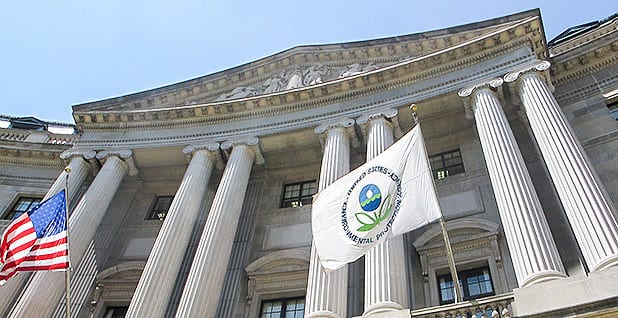 ELC students have worked across several semesters to address the urgent need to regulate toxic fluorinated chemicals (“PFAS”) at the local, state, and federal level. In this op-ed, ELC, its most recent clients, and its allies exhort the U.S. EPA to designation PFAS as “hazardous waste” in response to two pending petitions to the agency.
ELC students have worked across several semesters to address the urgent need to regulate toxic fluorinated chemicals (“PFAS”) at the local, state, and federal level. In this op-ed, ELC, its most recent clients, and its allies exhort the U.S. EPA to designation PFAS as “hazardous waste” in response to two pending petitions to the agency. - ELC presents at Oregon public interest environmental conference regarding oil drilling, oil spills, and our clinic’s legal response (March 8, 2020)
ELC students, clients, and co-counsel collaborated on a presentation, “No Arctic Ice, More Arctic Oil, & a 26-year-old Spill Response Plan! What’s Our Counter-Plan?”, at the University of Oregon’s annual Land, Air, Water conference, held as a virtual conference due to Covid-19 travel restrictions. - Clinic Sues U.S. EPA Over Dangerous, Outdated Plan for Oil Spill Response (January 30, 2020)
ELC and the Center for Biological Diversity filed a lawsuit in federal court in San Francisco to compel the Environmental Protection Agency to issue rules restricting use of toxic chemicals to “clean up” oil spills. Instead of mitigating harm, these chemical dispersants have proven to be more toxic to humans and the environment than oil alone. Our suit was covered in the environmental trade press here and here. - Clinic Petitions U.S. EPA to List Dangerous Chemicals in Drinking Water as “Hazardous Waste” (January 16, 2020)
 On behalf of the Green Science Policy Institute and community groups nationwide whose drinking water is contaminated with toxic and persistent fluorinated chemicals (“PFAS”), the Environmental Law Clinic has petitioned the U.S. Environmental Protection Agency to designate hundreds of known-dangerous PFAS chemicals as “hazardous waste,” and regulate them stringently from cradle to grave. ELC’s director describes the petition’s purpose and context in this blog post. The petition has been featured in trade and local press, on public radio, and on local TV in Michigan, a state with extreme PFAS contamination.
On behalf of the Green Science Policy Institute and community groups nationwide whose drinking water is contaminated with toxic and persistent fluorinated chemicals (“PFAS”), the Environmental Law Clinic has petitioned the U.S. Environmental Protection Agency to designate hundreds of known-dangerous PFAS chemicals as “hazardous waste,” and regulate them stringently from cradle to grave. ELC’s director describes the petition’s purpose and context in this blog post. The petition has been featured in trade and local press, on public radio, and on local TV in Michigan, a state with extreme PFAS contamination. - ELC works to assure equity while decarbonizing our energy system (December 3, 2019)
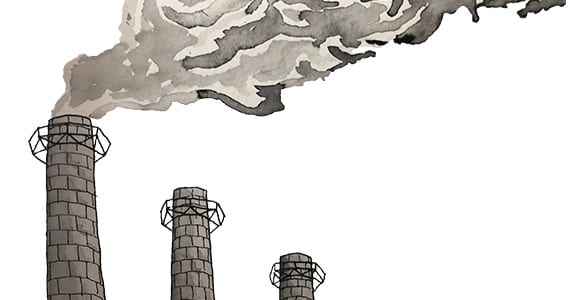 ELC’s work to assure equity while decarbonizing our energy system was recently featured in this Berkeley Science Review story, “Carbon-Powered Inequality,” describing cross-disciplinary efforts at UC Berkeley to address social justice and environmental protection simultaneously.
ELC’s work to assure equity while decarbonizing our energy system was recently featured in this Berkeley Science Review story, “Carbon-Powered Inequality,” describing cross-disciplinary efforts at UC Berkeley to address social justice and environmental protection simultaneously. - Clinic students file comments responding to the California PUC’s affordability proposal (November 26, 2019)
Following a historic ELC-assisted victory, where the California Public Utilities Commission committed $56 million to invest in affordable energy pilot projects in the San Joaquin Valley, the clinic continues to advocate to ensure these projects are implemented efficiently and equitably. In at least 170 communities throughout the Valley, low-income residents and residents of color have been denied access to safe and affordable energy. Responding to the commission’s latest affordability proposal, clinic students filed comments at the end of November, pushing for a longer time period for the discount and wider access. -
ELC alumna is panelist at State Water Board workshop on access to sanitation for the homeless (April 19, 2019)
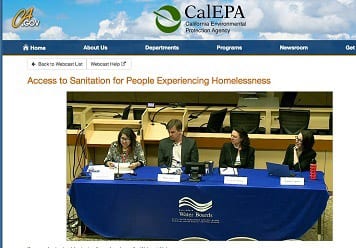 The State Water Resources Control Board recently held a day-long workshop on improving access to sanitation services for people experiencing homelessness, drawing in significant part on the clinic’s spring 2018 report for client Environmental Justice Coalition for Water. (Pictured far right: ELC alumna Sandra Lupien M.P.P. ’18, who has continued to work with our client on water access issues after graduation.)
The State Water Resources Control Board recently held a day-long workshop on improving access to sanitation services for people experiencing homelessness, drawing in significant part on the clinic’s spring 2018 report for client Environmental Justice Coalition for Water. (Pictured far right: ELC alumna Sandra Lupien M.P.P. ’18, who has continued to work with our client on water access issues after graduation.) - Nationwide media coverage of ELC lawsuit re: offshore oil spill response plan (March 25 & 26, 2019)
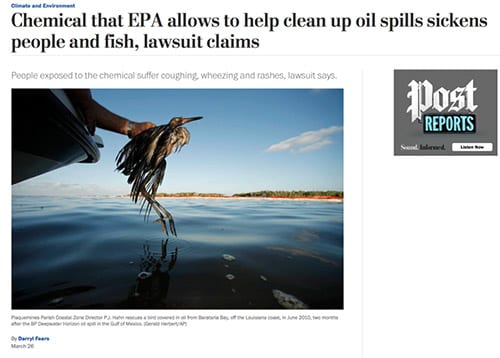 ELC’s announcement of its intent to sue the U.S. Environmental Protection Agency (EPA) regarding the need to update the nation’s dangerous, outdated oil response plans was covered in print and radio media from Alaska to the Gulf Coast to EPA’s home of Washington, D.C. Read the stories, along with an op-ed in The Guardian co-authored by an ELC student and a clinic client, here.
ELC’s announcement of its intent to sue the U.S. Environmental Protection Agency (EPA) regarding the need to update the nation’s dangerous, outdated oil response plans was covered in print and radio media from Alaska to the Gulf Coast to EPA’s home of Washington, D.C. Read the stories, along with an op-ed in The Guardian co-authored by an ELC student and a clinic client, here. - Preventing oil spill catastrophe: Clinic announces intent to sue U.S. EPA over outdated oil spill response regulations (3/25/19)
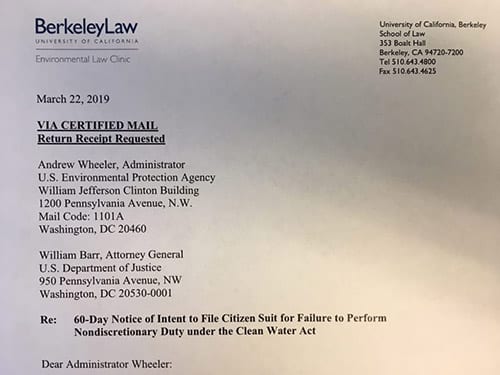 ELC today issued a Notice of Intent to Sue to the federal Environmental Protection Agency over that agency’s ongoing, illegal authorization of the use of toxic chemicals in an effort to disperse oil after offshore oil spills. The use of dispersant chemicals following the Exxon Valdez spill (1989) and BP Deepwater Horizon disaster (2010) sickened coastal communities and spill response workers. ELC represents ALERT, an oil spill response project of marine toxicologist Dr. Riki Ott; the nonprofits Alaska Coalition for Action on Toxics and Cook Inletkeeper; a commercial fisherwoman on the Gulf Coast of Louisiana whose family suffers persistent illnesses from the chemicals used in the BP Deepwater Horizon response; and an Inupiat woman living on the North Slope of Alaska who has organized to ban the use of dispersants in Alaskan Native villages.
ELC today issued a Notice of Intent to Sue to the federal Environmental Protection Agency over that agency’s ongoing, illegal authorization of the use of toxic chemicals in an effort to disperse oil after offshore oil spills. The use of dispersant chemicals following the Exxon Valdez spill (1989) and BP Deepwater Horizon disaster (2010) sickened coastal communities and spill response workers. ELC represents ALERT, an oil spill response project of marine toxicologist Dr. Riki Ott; the nonprofits Alaska Coalition for Action on Toxics and Cook Inletkeeper; a commercial fisherwoman on the Gulf Coast of Louisiana whose family suffers persistent illnesses from the chemicals used in the BP Deepwater Horizon response; and an Inupiat woman living on the North Slope of Alaska who has organized to ban the use of dispersants in Alaskan Native villages. - California’s Human Rights Crisis: A Webinar on Inadequate Access to Water and Sanitation by Homeless Residents (2/15/19)
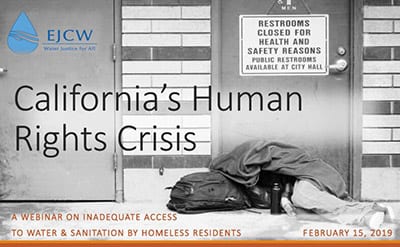 This webinar, hosted by clinic client, the Environmental Justice Coalition for Water (EJCW), builds upon an Environmental Law Clinic report for EJCW. It was produced and moderated by Clinic alumna Sandra Lupien. Read about the Commission’s groundbreaking decision, and the role of ELC, its clients and its co-counsel in achieving it.
This webinar, hosted by clinic client, the Environmental Justice Coalition for Water (EJCW), builds upon an Environmental Law Clinic report for EJCW. It was produced and moderated by Clinic alumna Sandra Lupien. Read about the Commission’s groundbreaking decision, and the role of ELC, its clients and its co-counsel in achieving it. - ELC Successfully Advocates for the California Public Utilities Commission to Provide San Joaquin Valley Residents Cleaner and Safer Energy Options (12/2018).
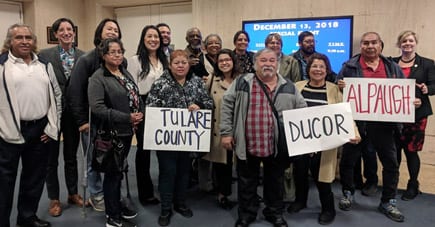 ELC played a central role in the approval of a $56 million investment of affordable energy resources, including community solar, in 11 San Joaquin Valley communities. Some of these communities were historically redlined and have been trying to get access to affordable energy for an astonishing 50 years. Read about the PUC’s decision here.
ELC played a central role in the approval of a $56 million investment of affordable energy resources, including community solar, in 11 San Joaquin Valley communities. Some of these communities were historically redlined and have been trying to get access to affordable energy for an astonishing 50 years. Read about the PUC’s decision here. - Clinic urges EPA not to weaken vehicle GHG emissions standards (9/10/2018). Read former ELC Fellow Purba Mukerjee’s blog about the letters here.
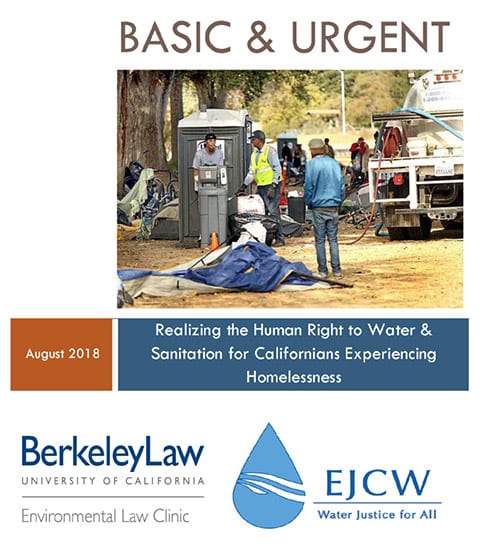 Clinic highlights urgency of sanitation and drinking water needs for persons experiencing homelessness (8/23/2018)
Clinic highlights urgency of sanitation and drinking water needs for persons experiencing homelessness (8/23/2018)- ELC Director explains coffee cancer warnings in Sac Bee (4/23/2018) and L.A. Times (5/10/2018)
-
ELC client Dr. Joel Moskowitz received the James Madison Freedom of Information Award from the Society of Professional Journalists
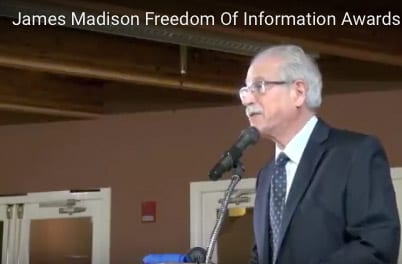 Northern California Chapter, for the public records litigation brought on his behalf by ELC and the First Amendment Project. This case forced the state’s public health department to release information about suspected health harms from cell phone radiation, and advise the public about precautionary measures. Moskowitz said the information disgorged through our case victory has now been covered in 200 media outlets in 48 countries (where it is having multilocal policy effects). (4/10/2018)
Northern California Chapter, for the public records litigation brought on his behalf by ELC and the First Amendment Project. This case forced the state’s public health department to release information about suspected health harms from cell phone radiation, and advise the public about precautionary measures. Moskowitz said the information disgorged through our case victory has now been covered in 200 media outlets in 48 countries (where it is having multilocal policy effects). (4/10/2018) - California activists applaud state’s new cell phone safety advisory (12/15/2017)
- Environmental Law Reporter features ELC student article on drinking water protection stemming from clinic water justice project (9/2017)
-
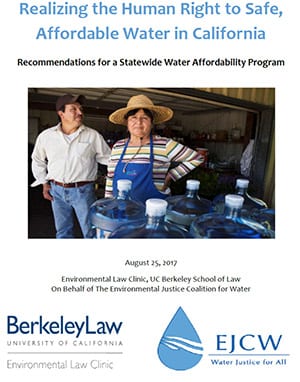 Clinic recommends to State Water Board ways to make safe water affordable to all (8/25/2017). Read campus press coverage here.
Clinic recommends to State Water Board ways to make safe water affordable to all (8/25/2017). Read campus press coverage here.
- ELC Director profiled in Sierra magazine (8/22/2017)
-
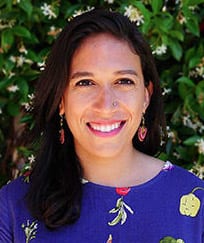 Purba Mukerjee joins as Environmental Health Fellow (6/5/2017)
Purba Mukerjee joins as Environmental Health Fellow (6/5/2017)
-
Clinic urges EPA Administrator to strengthen federal drinking water protections (5/15/2017)
-
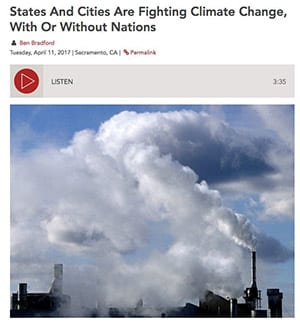 States and Cities Are Fighting Climate Change, With or Without Nations (4/11/2017)
States and Cities Are Fighting Climate Change, With or Without Nations (4/11/2017)
-
State kept secret guidelines on safe cell phone use (3/3/2017)
-
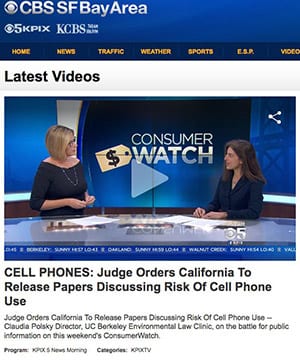 Video: ELC case victory!: CBS News features Environmental Law Clinic Director discussing favorable court ruling in case about cell phone radiation (2/26/2017)
Video: ELC case victory!: CBS News features Environmental Law Clinic Director discussing favorable court ruling in case about cell phone radiation (2/26/2017)
-
Dynamic Duo: Two New Fellows Help Fuel Environmental Law Projects (8/3/2016)
-
Environmental Law Clinic Takes On Urgent Issues (4/14/2016)
-
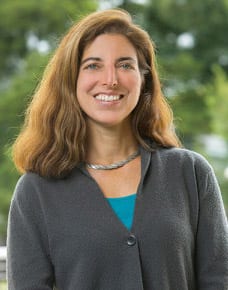 Claudia Polsky ’96 Chosen to Lead New Environmental Law Clinic (7/20/2015)
Claudia Polsky ’96 Chosen to Lead New Environmental Law Clinic (7/20/2015)